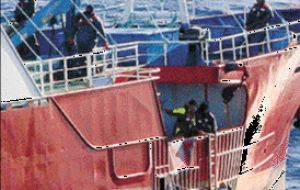MercoPress. South Atlantic News Agency
African coastal states organize network to tackle illegal fishing
 The IUU workshop took place in Cape Town earlier this month
The IUU workshop took place in Cape Town earlier this month Representatives from African coastal states attend a workshop in the United Kingdom designed to build capacity in tackling illegal, unregulated and unreported (IUU) fishing. IUU fishing is damaging to fish stocks, the marine environment, food security and wider economic growth and development.
The Southern Ocean is often targeted by this practice and IUU fishing operations have traditionally exploited weak controls in African coastal states when landing their catches.
To address the issue the Foreign and Commonwealth Office’s Polar Regions Unit proposed, and then successfully convened a workshop in Cape Town between 3-6 August, in collaboration with Australia, South Africa, the New Partnership for Africa’s Development’s Partnership for African Fisheries, and the Commission for the Conservation of Antarctic Marine Living Resources (CCAMLR).
The workshop was funded by CCAMLR, using money donated by the UK in 2001, obtained from the sale of fish confiscated from an illegal vessel operating in the waters of South Georgia and the South Sandwich Islands.
Representatives from 12 African coastal states attended the workshop which was heavily oversubscribed. The aim of the gathering was to create a network of stakeholders who could work together to identify the challenges involved for African states when tackling IUU fishing, and implement solutions to these problems. Delegates were also provided with information on relevant port and flag-state measures, and were offered a practical fishing vessel inspection in port.
Delegates were also asked to identify actions for implementation on return – these included strengthening port controls, signing up to the Food and Agriculture Organisation Agreement on Port State Measures, better communication across relevant government departments and enhanced regional co-operation.
It is hoped that interventions such as this one can help to deliver lasting impact in the fight against IUU fishing.
The following African countries attended: Benin, Republic of the Congo, Ghana, Kenya, Maritius, Mozambique, Namibia, Nigeria, Seychelles, South Africa, Tanzania and Togo.
CCAMLR came into force in 1982 as part of the Antarctic Treaty system. It aims to conserve marine life in the Southern Ocean through controls on the rational use and sustainable harvest of fish stocks. It covers 12% of the world's ocean between 45-60 degrees South.




Top Comments
Disclaimer & comment rulesCommenting for this story is now closed.
If you have a Facebook account, become a fan and comment on our Facebook Page!